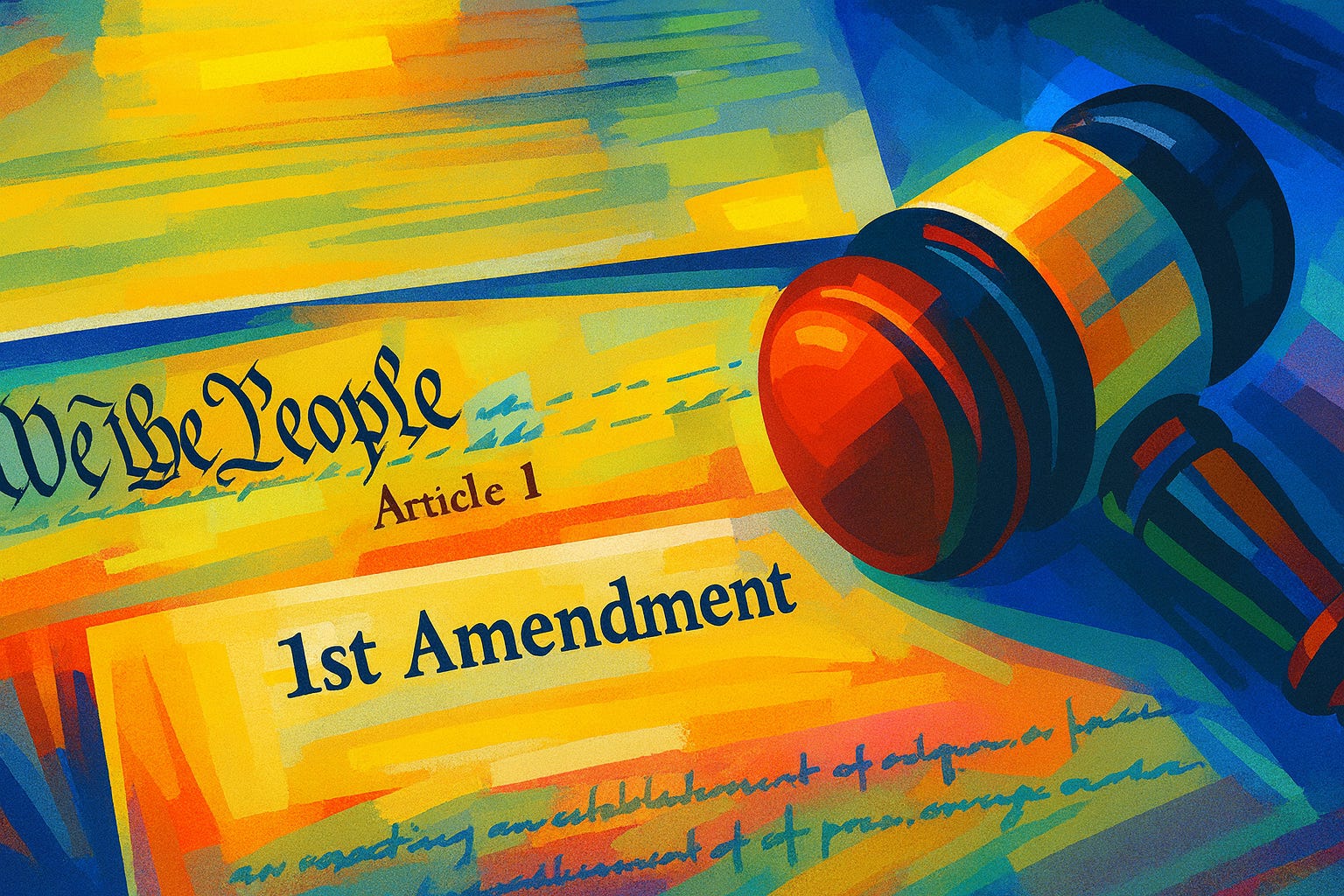Chiles v. Salazar: a Defining Test for the First Amendment
Can Colorado ban treatment that helps kids overcome gender dysphoria?
Reality’s Last Stand is a reader-supported publication. Please consider becoming a paying subscriber or making a one-time or recurring donation to show your support.
About the Author
Dr. Colin Wright is an evolutionary biology PhD, Manhattan Institute Fellow, and CEO/Editor-in-Chief of Reality’s Last Stand. His writing has appeared in The Wall Street Journal, The Times, the New York Post, Newsweek, City Journal, Quillette, Queer Majority, and other major news outlets and peer-reviewed journals.
In what may become the most important free speech case of the decade, the Supreme Court on October 7 heard oral arguments in Chiles v. Salazar, a challenge to Colorado’s ban on “conversion therapy” for minors. The petitioner, licensed counselor Kaley Chiles, argues that the law violates her First Amendment rights by preventing her from offering voluntary talk therapy to young clients who want help accepting their biological sex. (The respondent in the case is Patty Salazar, executive director of the Colorado Department of Regulatory Agencies.) At stake is not only therapists’ professional freedom but parents and minors’ ability to seek counseling consistent with their beliefs about sex, identity, and morality.
Colorado’s law, passed in 2019, prohibits licensed counselors from performing “conversion therapy” on minors, defined as any practice or treatment that seeks to change a person’s sexual orientation or “gender identity,” including attempts to modify behavior, expression, or attraction. While the law bans forms of therapy that help a child accept his biological sex, it allows those that affirm cross-sex identities or encourage transition.
In 2022, Chiles sued the state, arguing that this discrepancy reveals its intention to silence viewpoints it dislikes. The Tenth Circuit Court of Appeals rejected her argument, deeming her form of therapy “professional conduct” that the state can regulate. The Supreme Court took up the case after a split emerged in the lower courts: the Third and Ninth Circuits upheld similar laws, while the Eleventh Circuit struck down a similar law as an unconstitutional restriction on speech.
James Campbell, the attorney representing Chiles, described Colorado’s law as an assault on the First Amendment. “Colorado forbids counselors like Kaley Chiles from helping minors pursue state-disfavored goals on issues of gender and sexuality,” he said, and “prophylactically bans voluntary conversations, censoring widely held views on debated moral, religious, and scientific questions.” Campbell argued that the Tenth Circuit’s ruling had “gutted” the protections for professional speech in National Institute of Family and Life Advocates v. Becerra (2018) and allowed states to turn counselors into “mouthpieces for the government.”
Chiles’s therapeutic approach, Campbell noted, involves speech, and nothing more. She offers no prescriptions, no physical interventions, and no coercion—just conversation. That distinction, Campbell argued, is critical, since the First Amendment protects the exchange of ideas even within a professional setting.
Chief Justice John Roberts and Justice Elena Kagan asked how the legal analysis would change if a therapist combined counseling with medical treatment, such as by prescribing medication or hormones. Campbell said that such situations would be different because speech tied directly to conduct can sometimes be regulated. But pure talk therapy, Campbell suggested, is almost always constitutionally protected.
Justice Sonia Sotomayor opened with a procedural line of questioning, interrogating Chiles’s standing to sue. She asked whether the therapist faced a credible threat of prosecution given that Colorado has not recently enforced this law. Campbell countered that Colorado “[has] not disavowed enforcement” and noted that anonymous complaints had recently been filed against his client, demonstrating the existence of the threat.
Justice Ketanji Jackson repeatedly sought to clarify what constitutes “treatment.” She invited Campbell to respond to the Tenth Circuit’s ruling that states can regulate therapists’ speech as conduct, since “speech is the tool” that therapists use “to provide treatment.” Campbell dismissed this reasoning, noting that the relevant constitutional distinction is whether the regulated activity consists solely of speech.
“If the treatment consists only of speech,” he said, “then it doesn’t trigger the speech-incidental-to-conduct doctrine. Here, we’re just in First Amendment land, where there is full, robust protection.”
When Principal Deputy Solicitor General Hashim Mooppan stood to argue for the United States in support of Chiles, he asserted that “Colorado’s law is subject to strict scrutiny under the First Amendment.” That’s the highest constitutional standard, requiring the state to prove that its law serves a compelling interest and does so in the least restrictive way possible—a test that almost no speech restriction survives.
Colorado’s law is properly subject to this test, Mooppan argued, for three reasons: it targets speech based on viewpoint; it doesn’t regulate any nonspeech conduct; and, before Colorado, no state in history had banned professional speech of this kind. Further, he dismissed the notion that labeling counselors’ speech as “medical treatment” exempts it from First Amendment protection, noting that “there’s nothing conceptually different” between speech in therapy and speech anywhere else.
In an exchange with Justice Jackson, Mooppan highlighted the implications of Colorado’s logic. If a state can ban forms of talk therapy because they do not align with the standard of care, it could, by the same reasoning, have “made it illegal for a therapist in the state to counsel a gay patient that they weren’t mentally ill” in the 1970s, when “it was the standard of care, professional consensus, that being gay was a mental illness.” More fundamentally, he noted in an exchange with Justice Barrett, Colorado has “no evidence” that voluntary, non-coercive talk therapy by licensed professionals with minors causes harm.
Last week’s arguments demonstrated that the Chiles case isn’t just about counseling techniques but about whether the government can enforce a particular ideology under the banner of public health. Colorado’s law forbids therapists from helping clients pursue one kind of goal—reconciling to their biological sex—while allowing and arguably encouraging therapists to help clients pursue the opposite.
In other words, the state effectively promotes the “gender-affirming” worldview and silences competing perspectives. This harms kids, Campbell warned, as “up to 90 percent of kids who struggle with gender dysphoria before puberty work their way through it and realign their identity with their sex.” Yet under Colorado’s law, any therapist who helps a child do that could lose his license or be punished.
Still, even some critics of “gender-affirming care” are uncomfortable with Chiles’s argument. They say that the line between speech and conduct isn’t as clear-cut as it seems, because in therapy, speech is the primary tool of treatment. Just as a doctor’s bad medical advice can harm a patient even if no medication is prescribed and no procedure is performed, words in a therapeutic setting are often intended to change how a person thinks, feels, or behaves.
From that perspective, therapy isn’t merely a conversation, but a psychological intervention with real effects. These critics worry that a sweeping First Amendment ruling in Chiles’s favor could also shield “gender-affirming” talk therapies from regulation, making it harder to limit those interventions for minors.
That dilemma reflects the difficulty of drawing clear lines between protected speech and professional conduct at a time when medicine itself has become deeply politicized. Institutions that should be setting evidence-based standards have instead adopted ideological positions, routinely ignoring or minimizing data that challenge the dominant narrative. When professional organizations stop policing themselves, judges are left to sort disputes that should have been resolved through open debate within medicine.
That’s exactly why free expression in professional settings is so important. If the state can decide which psychological approaches are acceptable based on ideology, it effectively gains the power to define truth. The First Amendment exists to prevent that, ensuring that moral and scientific questions remain open for discussion, even inside therapy offices and clinics.
The Court’s decision will have consequences far beyond Colorado. A ruling for Chiles would reaffirm that licensed professionals don’t lose their free-speech rights and that states generally cannot ban talk therapy, even when it involves controversial subjects like gender and sexuality. It could overturn similar laws in more than 20 states and mark a turning point against ideological control in medicine and psychology.
Still, as noted earlier, even a free speech victory could carry risks. Expanding First Amendment protections for talk therapy might also shield “gender-affirming” interventions from scrutiny. It’s a reminder that defending liberty often means accepting uncertainty—and that freedom, unlike orthodoxy, cannot perfectly guarantee one’s desired outcome.
The deeper tragedy of this case is that it exists at all. In a world where medical institutions remained grounded in evidence instead of ideology, courts wouldn’t need to intervene. But because the gatekeepers of science and medicine have surrendered their authority to politics, the judiciary is now left to vindicate basic freedoms that should never have been imperiled.
This essay first appeared in City Journal on October 14, 2025.
Thank you for supporting Reality’s Last Stand! If you enjoyed this article and know someone else you think might enjoy it, please consider gifting a paid subscription below.










Indeed, "The deeper tragedy of this case is that it exists at all. In a world where medical institutions remained grounded in evidence instead of ideology, courts wouldn’t need to intervene. But because the gatekeepers of science and medicine have surrendered their authority to politics, the judiciary is now left to vindicate basic freedoms that should never have been imperiled."
And the tragedies within families that have imploded by this ideology is beyond most people's ability to comprehend. Parents such as myself and thousands of others will never be the same from this unchecked ideology invading our homes and lives and swallowing one or more of our kids. We live in a nightmarish state every day.
Let me see whether I've got this right: a therapist must "affirm", that is, encourage a child sufferimg from the delusion that he belongs to the opposite sex but is prohibited from seeking to help the child recover from that delusion and get back in touch with material reality. Is that what's at stake here?
I do wonder what the people involved in this lawsuit would have to say about a therapist's responsibility when presented with one of the rare cases of, say, lycanthropy or some equally dysfunctional thought process.
How on earth did we get to the point of accepting the notion that it was compassionate and good medicine to mutilate a delusional patient's body to convert it to (a poor imitation of) the opposite sex and convert his undesirable same-sex attraction to a supposedly more acceptable opposite sex was orientation.